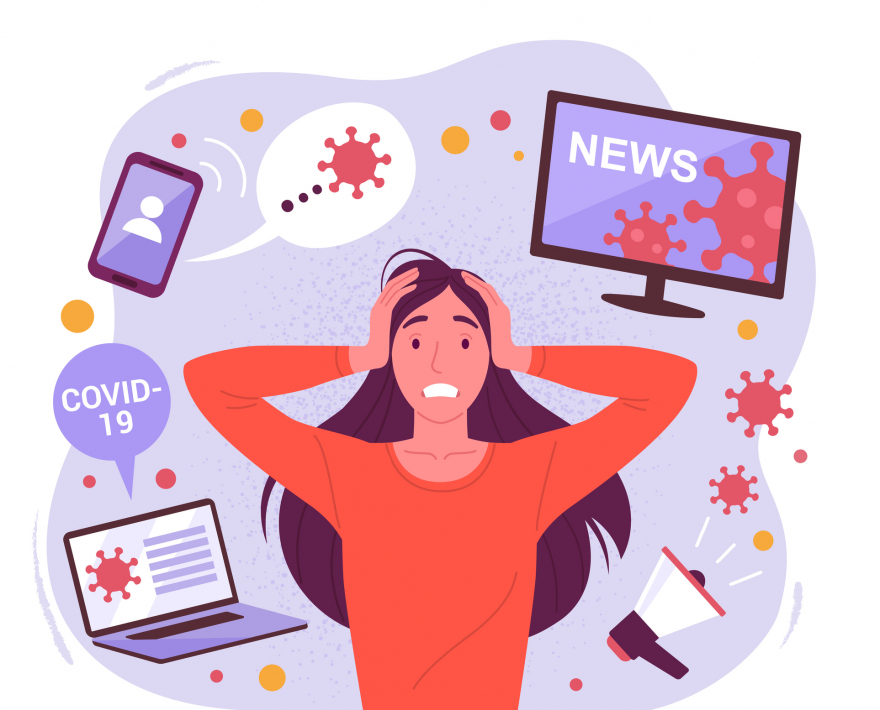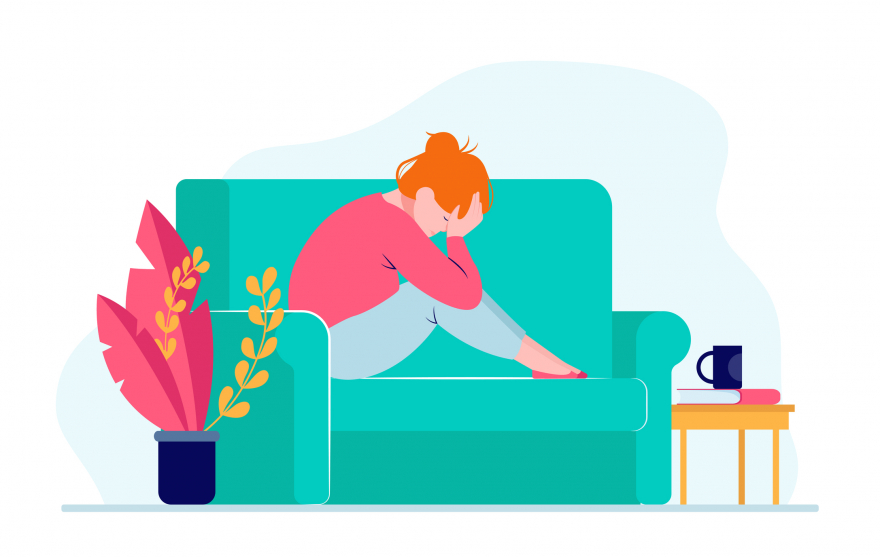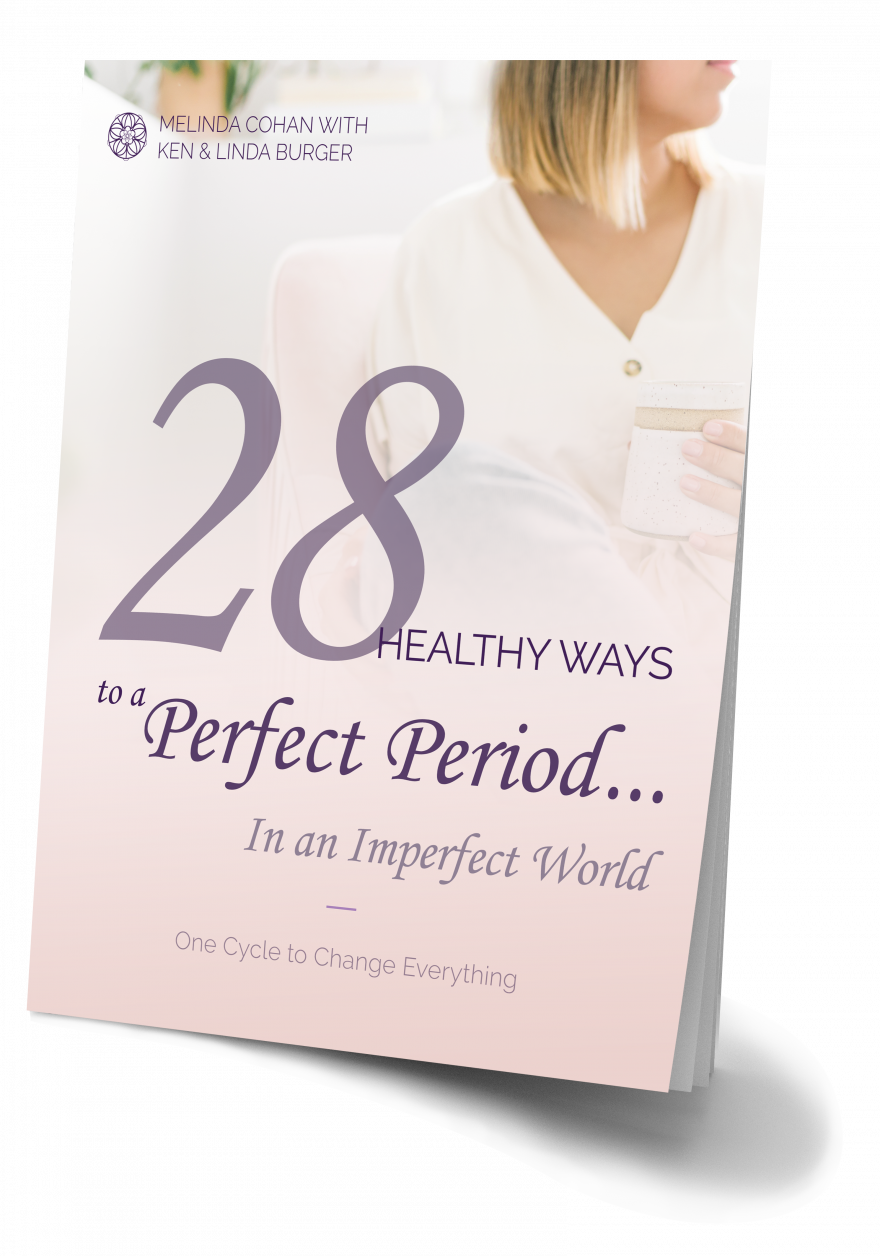How the Pandemic and COVID-19 May Affect Your Menstrual Cycle
 The pandemic, virus, lockdowns and other restrictions have turned everyone’s lives upside down for the past 14 months. While parts of the world are starting to see signs of emerging from the pandemic, the impact it’s having on our bodies, including our menstrual cycles, may still be present for a while. The pandemic, virus, lockdowns and other restrictions have turned everyone’s lives upside down for the past 14 months. While parts of the world are starting to see signs of emerging from the pandemic, the impact it’s having on our bodies, including our menstrual cycles, may still be present for a while.
A big question we’re hearing women ask is: Can the COVID-19 virus affect my periods?
In general, viral infections can put your body under stress and consume a lot of your body’s resources (similar to the flu or common cold). This means that ovulation and menstruation may not get the attention they need as your immune system focuses on fighting the virus.
One 2020 study evaluated the menstrual patterns of women with confirmed COVID-19 infection. In this study, there was no significant change for most women. However, 25% reported changes in menstrual volume, mainly a decrease in bleeding (20%). Another 19% experienced a prolonged cycle. The study also reported that their normal menstrual cycle quickly resumed after recovery from the virus.
There are a lot of theories. Many women are tracking and noticing patterns, but there’s still much that isn’t known about COVID-19 and the menstrual cycle.
If you experience a change in the pattern of your menstrual cycle for more than two months, contact your doctor. While changes to your menstrual cycle may be nothing to be concerned about, in some cases, this can signal bigger health issues that may need some extra attention.
Here are some signs indicating when you may want to contact your doctor to talk about your period:
- Frequently having periods fewer than 24 days apart
- Consistently bleeding for longer than 7 days
- Regularly going two or more months between periods
- Frequent spotting between periods
- Heavy bleeding (needing to change your pad or tampon every hour or more)
- Clots larger than the size of a quarter
- Excessive clotting
Even if you haven’t been infected with the COVID-19 virus, there’s still a chance that your menstrual cycle may be affected.
 Most experts believe that these changes can be due to stress, lifestyle changes throughout the pandemic, and the continued uncertainty about what lies ahead. According to the Office of National Statistics, 46.9% of those surveyed reported suffering from high anxiety during the pandemic. Most experts believe that these changes can be due to stress, lifestyle changes throughout the pandemic, and the continued uncertainty about what lies ahead. According to the Office of National Statistics, 46.9% of those surveyed reported suffering from high anxiety during the pandemic.
I think it’s safe to say that for most people, there was more fear, anxiety and uncertainty in 2020 (and still continuing today) than in recent decades.
“If we already know that life events can make PMS symptoms feel worse, that tells us something about what is happening during something as all-consuming and life-changing as a global pandemic,” Heather Currie, MD, the associate medical director at Dumfries and Galloway Royal Infirmary in the UK, told The Guardian.
Issues with your periods can be affected by your emotional state.
Check out our article to learn more about The Impact of Stress on Your Periods.
Currie goes on to say that “it is important for women to try to recognize what else is going on in their lives that could be making their symptoms feel worse.”
According to the National Institute of Mental Health, the pandemic can cause stress in many ways, including:
- fear for personal health and the health of others
- changes in daily eating and sleeping habits
- heightened chronic health issues
- increased use of alcohol, tobacco, or other substances
Even stressors related to your job, adjustments in children's school and sporting schedules, updates in CDC guidelines about vaccines, lessening restrictions, wearing masks, and social distancing can all have a mental and emotional impact. Any of these stressors could affect your menstrual cycle, specifically the frequency, amount or length of your flow.
Each woman’s body may react a little differently to the stress of the pandemic. Tracking your menstrual cycles can be an important step to take so you can become more aware of what is going on with your cycle and identify patterns that may not be typical for you. If you’re the least bit concerned, share this information with your doctor so they can support you in the best way possible.

I want to introduce you to Kara who knows firsthand about how the pandemic can dramatically impact stress levels.
Kara is happily married and a mother of two beautiful daughters, ages 12 and 14, and works in a nursing home as an Occupational Therapy Practitioner. She always struggled with her periods, having 1-2 days of bad cramps. Most months she would miss at least one day from work and spend it at home curled up on the couch with a heating pad because her cramps were so bad.
At the start of the pandemic, Kara was caring for the residents of the nursing home to keep them all safe and healthy. Her biggest stressors were not having clear guidelines or PPE at the outset of the pandemic, feeling unsafe and not having enough tools and information to keep patients safe. She was a frontline worker who eventually also had to mitigate patient isolation and depression, and help her patients to process loss of life. She explained this as “unimaginable.”
Like many other parents, Kara was also having to figure out how to maintain her job and manage her kids not going to school while they began to learn from home. On top of that, she was dealing with her husband’s art business slowing down. This was all over and above her own personal fears, doubts and concerns brought on by the pandemic.
Kara shared with us that “life is chaos right now in our lives because there’s no routines and things aren’t dialed in. There’s so much going on in our reality right now that it makes everything hard.” She was having a difficult time in every aspect of her life.
Coinciding with the start of the pandemic, she began to take Perfect Period.® (we like to call that a “happy accident”). Even while her life was upside down and her stress was high, this herbal formula provided a natural way for her body to support its hormonal balance.
After taking Perfect Period for just one cycle, here’s what she shared with us:
 “I've experienced astounding results! I didn't have any cramps for this period (usually I have 2 days of heavy cramps)! Usually, I'm on the couch with a heating pad for one day because they're so bad. It's great to not have to deal with period issues on top of everything going on in my world right now. I'm a believer in Perfect Period.” “I've experienced astounding results! I didn't have any cramps for this period (usually I have 2 days of heavy cramps)! Usually, I'm on the couch with a heating pad for one day because they're so bad. It's great to not have to deal with period issues on top of everything going on in my world right now. I'm a believer in Perfect Period.”
Even without a pandemic, there is enough in this world that contributes to your stress. Your period shouldn't be one of them. Including Perfect Period in your daily routine can support your body’s natural hormonal balance, letting you focus on all the other important areas of your life that require your attention and energy.
What we loved about Kara’s story is that while normally her period would be a distraction from her being able to do her job, at the height of the pandemic she wasn’t distracted by it. Instead, she was able to recoup that energy, time, and attention and put it towards her patients and her family. She could be the best version of herself, and bring all of herself to those who most needed it, even in the midst of the chaos.
To learn more about how Perfect Period could be a natural solution for your period issues, check out https://perfectperiod.com/what-is-perfect-period.

If you’re noticing changes in your periods, you’re not alone. Women around the world are also noticing patterns of change as well. The topic of menstrual cycles and periods is not a typical conversation we’re used to having, but it’s an important dialog to create.
If you’re curious about changes, don’t isolate and keep your worry inside. That could increase your symptoms.
Connect with trusted women in your life and share what you’re noticing.
For women - teens and older women alike - this topic can be a difficult conversation to address. Reach out to your gynecologist, primary care physician, or functional medical doctor and let them know what new developments you’re observing.
 Approach your mother, sister, aunt, God-mother, cousin, friend, colleague, or other trusted female figure and say “Can I share something that’s not easy for me to talk about? I’ve noticed some differences with my period over the past several months and I’d like to share them with someone. I’m concerned and I’d like your support.” Approach your mother, sister, aunt, God-mother, cousin, friend, colleague, or other trusted female figure and say “Can I share something that’s not easy for me to talk about? I’ve noticed some differences with my period over the past several months and I’d like to share them with someone. I’m concerned and I’d like your support.”
Often, just talking about it with other trusted women will relieve a lot of stress and doubt. They can support you in identifying your next best step:
- Have massive compassion with yourself and those around you when it comes to this subject.
- Know that if you’re experiencing changes, you are not alone and it’s okay to talk to others about this. Don’t assume “that’s just the way it is.”
- Approach it with curiosity to see what you can learn.
For older women, maybe even past menopause, reach out to your daughters or the younger ladies in your life - it’s often easier to lead by example and start the dialog when they may not know how. Share with your daughter, niece, etc. what you’ve noticed about any changes you’ve had in your menstrual cycle (positive or negative) during the pandemic or that you’ve heard or read about.
Let her know it’s okay and helpful to talk about this. Ask her questions. Don’t drill her with questions, simply come from a place of curiosity, care, and creating a sense of safety. Say to her “I’ve been reading about how the pandemic and COVID could be affecting women’s periods. I wanted to check in with you to see if you’ve noticed any changes. I know this is often an uncomfortable topic, but it’s important that we support one another. Have you noticed any changes?”
Then listen. Her response may not come right away. It may even take days for her to reply to you. That’s okay. Continue to be there for her and keep an open dialog so when she’s ready she’ll feel comfortable coming to you.


To discover additional ways that you and your loved ones can reduce stress and eliminate period issues, be sure to download our free resource: 28 Healthy Ways to a Perfect Period in an Imperfect World guide and journal.
This resource is filled with alternative solutions, including our Perfect Period supplement, to reduce stress, create a better period experience, and increase your overall well-being.

|